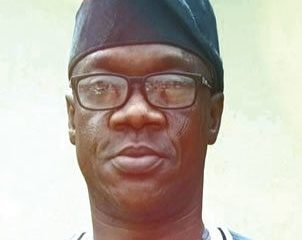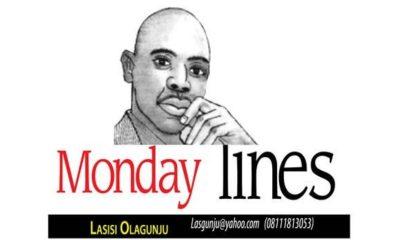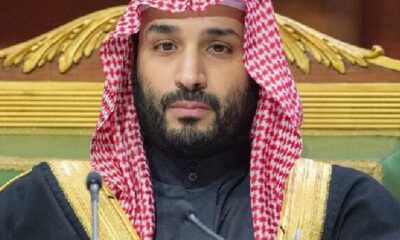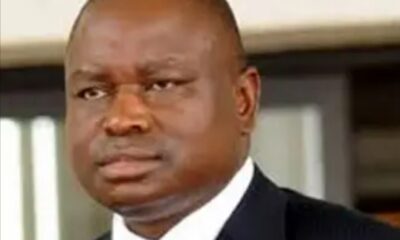News
OPINION: FG’s N90 Billion Hajj Politics
Published
4 weeks agoon
By
Editor
By Lasisi Olagunju
From Lagos, one Ayinde Salihu wrote to the Sardauna of Sokoto and Premier of the Northern Region, Alhaji Ahmadu Bello, on 19 January, 1964, describing the premier as the “Prophet of Nigeria.” The man wanted the Sardauna to take him to Mecca for Hajj. Buliyaminu Oladiti Fadairo wrote from Ibadan on 21 January, 1964, saluting the Sardauna as “Nigerian Holiest Father.” It was his way of massaging the big man’s ego so that he would make him a pilgrim in that year’s Hajj. Same day from Kabba, Aruna Agbana wrote begging the Sardauna to sponsor his pilgrimage to Mecca “in the name of Allah and Annabi Muhammadu, the Holy Prophet…and in the name of Usman Dan Fodio…” The Sardauna had a standard response for all of them: “Pilgrimage is not obligatory if one has no means…” American professor of history, Mathew M. Heaton, has all the above in his ‘Ahmadu Bello and the Politics of Pilgrimage’. It is a chapter in his book on ‘Decolonising the Hajj’ published in 2023.
What the Sardauna said about pilgrimage not being “obligatory if one has no means” is the correct injunction prescribed in Islam. But, the injunction might be canonically true in 1964, it is no longer so today. Never mind that John Bunyan in ‘Pilgrim’s Progress’ says “what God says is best, is best though all the men in the world are against it.” The poet just wasted words. There are egregious carts everywhere today for the pilgrim to ride in short-circuiting faith and its precepts. They say the times determine what law to keep. They say that at every point in time, what the world carries is the child the times birth for it.
The way we fart while pricing irú (locust beans) is not the way we should fart while buying salt. But now, there are no limits to misbehaviour. Everywhere stinks. We shit in holy places and receive effusive thank you from the guardian priests. If he were alive, the powerful Sardauna would not have resisted the pressure to pay today – and remain relevant. A multitude of Nigerians (Muslim and Christian) desire the bliss of paradise which may be in holy pilgrimages but everyone wants someone else to pay for it. And they get it. ‘FG bows to pressure, approves N90 billion subsidy for Hajj fares’ was how The Guardian headlined its report on a payment of subsidy for Hajj. I read it in other papers also. The payment is unprecedented in the hugeness of the figure. And the government has not said the media lied. Hajj is an obligation which applies under clearly stated conditions – these include financial and physical capability. But now, every year, pressure, threats, and blackmail are rained on presidents and governors to sponsor pilgrims. And they cave in to do what is wrong. They forget that they were elected to say no to irregularities; that sometimes, resistance may be politically inexpedient and tough, but in resisting wrong lies victory. “Dark clouds bring waters, when bright bring none” – Bunyan’s Pilgrim’s Progress again. Robbing the Peter of millions of Nigerians to foot the bill of elitist Paul is a mark of the beast. But it is the new normal. Governments sponsor thousands to Mecca and Jerusalem in exchange for political support.
FROM THE AUTHOR: OPINION: Murder And Vengeance In Okuama
I call the Nigerian elite culture which allowed this payment an ‘Aj’ìfà’ culture. Aj’ìfà is that person who grows fat reaping big where he sows little – or reaps without sowing at all. Someone else said elsewhere that Nigeria is an “Aj’òfé society.” That somebody is Ladun Anise, late professor of political science, who explains in a 1979 journal article that the word Aj’òfé is a Yoruba word meaning ‘free-loader’ or ‘parasite.’” I nodded as I read his further explanation that “an aj’òfe society carries a parasitic culture; builds its expectations on what the government can and must do (for them) with no sense of individual or group responsibility…It is a culture in which people are determined to turn constrained privileges into fundamental constitutional rights or even the precepts of natural law.” I understand that some of the intending pilgrims are threatening to pull out of this year’s hajj unless the government pays the balance of N1.9 million for them. The country is a fallen elephant before a pack of cleavers.
We married a wife in the month of famine and in that same month of lack, she decided to use pounded yam to build a house. What name would you give that kind of wife? What baby would the woman birth, and what will the name be? The question is elegantly answered in the original Yoruba version of that proverb: Ìyàwó tí a fé l’ósù agà tí n fi’yán mo’lé, yóò-báa-níbè lorúko omo rè yóo máa jé. ‘Yo-ba-nibe’ (e go meet am there), the reserved name for the expected product of the conjugal error, forebodes tragic delivery. I thought our husbands said the country was broke and all subsidies should go -and was gone. Now we know they lied. The Federal Government that said no to what benefitted 200 million Nigerians last May has released N90 billion to subsidise the purse of about 50,000 persons (or of their rich sponsors) so that they could make a personal religious journey to Saudi Arabia. It is a subsidy for politics.
What you value is what you invest your riches in. A wealthy man with a million slaves dies, but in his wardrobe is found one lone dress (Oun tó ndun ni níí pò l’órò eni. Ológún erú kú, aso o rè kù ìkan soso). That is my people’s proverb for otherwise wise men with deliberately misplaced priorities. We’ve always known that politics pays better than education in Nigeria. The N90 billion Hajj subsidy is higher than the combined 2024 budgets of the University of Ibadan (N23.4billion), Obafemi Awolowo University (N17.1 billion), Ahmadu Bello University (N29.2 billion) and the University of Lagos (N19.4billion). So, what is the matter prioritized here? The government did not spend that money for religion. It was for politics and the need to avoid the political consequences of hurting Nigeria’s powerful entrepreneurs of pilgrimage.
FROM THE AUTHOR: OPINION: Nigeria: A History Of Scandals
The Obafemi Awolowo government of the old Western Region set up Nigeria’s first Pilgrims Welfare Board vide Western Regional Gazette No. 39, vol. 7 of 5th June, 1958. The board’s existence was dictated by the need to attend to issues of welfare of hajj pilgrims from Western Nigeria. The northern region followed that example seven years later in 1965. Both boards were restricted by law to collecting Hajj fares from intending pilgrims, arranging passports for them, helping intending pilgrims to get visas and other consular interventions, assisting them with flight tickets and with vaccination, getting them comfortable accommodation and transportation in Saudi Arabia – all at their own expense. The limit of the responsibilities of the boards was the limit of government involvement in Hajj operations. Apart from one VIP Hajj flight per year involving the Sardauna and selected members of the northern elite, there are no records of any government-sponsored Hajj trip for anybody in any of the regions.
What is the official explanation (reason) for the Federal Government’s release of that subsidy for the Hajj? Each of the 48,414 intending pilgrims was initially supposed to pay N3.5 million, then it was jacked up to N4.9 million when the dollar raced past the strength of our sense. N4.9 million is a huge amount in this season of want. There was an outcry which the anti-subsidy government in Abuja heard and doused with a subsidy coolant which translated to N1.6 million per pilgrim. This N90 billion pilgrimage subsidy paid by this government I could not find anywhere in the 2024 budget of the Federal Government. Even in the pads and paddings, it is absent. So, where did the president conjure that humongous sum from?
Even after that intervention, there are further subsidies to pay. Because the forex crisis has set every plan ablaze, the total hajj fees payable is no longer N4.9 million per pilgrim. The hajj commission last week raised the fare by a further N1,918,032.91 blaming forex volatility. The amount is now N6.8 million per pilgrim. The arithmetic is well explained in a report by the Daily Trust some days ago which quoted a Hajj commission source: “By the previous calculation, the N90 billion given by the Federal Government can only subsidise 19,000 intending pilgrims by ₦3.5 million. But by spreading it on 50,000 pilgrims, it (the subsidy) reduced it (the shortfall) to N1.9 million. This means that the federal government has subsidised each pilgrim by ₦1.6 million…” There is still a shortfall of N1.9 million which each of the pilgrims has to pay. But they may not pay anything. Some state governments are paying it for them.
FROM THE AUTHOR: OPINION: Our President’s Love Affair With The IMF
A friend asked when this culture of using public funds to fund private religious acts started. It is difficult to know but it didn’t start with this regime. When a head would go bad, it starts its descent gradually, unnoticed. What I know is that there used to be pride in people using their hard-earned money to go to Mecca. O.E. Tangban in his ‘The Hajj and the Nigerian Economy’ (1991) traces this tradition of going to Mecca and notes that at the very beginning “ordinary people went on Hajj by land routes across Chad to Sudan and then by boat to Jeddah” – with their hard-earned money. Even big men did. Dunama, the second Muslim Mai (king) of Kanemi – what we know today as Borno – followed that route. History says he was the first around here to go on pilgrimage to Mecca. He went the first time and came back. He went the second time and returned in peace. He went the third time and perished in an accident in the Red Sea. There is no record that he stole from the poor to fund his Hajj.
Nigerians are a very religious people. You would think being this religious coheres with piety. Some of those whose Hajj fees we’ve just paid have gone to Mecca in many and repeated times – like Abiku. Indeed, for some, it is business – legit and illegit. A lot goes with pilgrimages – to Saudi Arabia and to Israel – which mocks the reason and essence of pilgrimage. On the current Hajj list will be mistresses, paramours and concubines of some ‘pious’ persons of influence. I witnessed a case some years ago. We are using scarce funds to sponsor the good and the bad and the very ugly. Some of the officials particularly hate the smell of roses. It is a chain. The known faces are mere masks of the very big men of religion who preach fiery sermons of godliness. To them, pilgrimage is their soup pot, their business, and they always find one verse somewhere to validate what they do. It didn’t start today.
A big businessman from a wealthy family in Kano was arrested, tried, convicted and fined £7,000 in Sudan in April 1957 for currency trafficking. He was the sole agent in charge of the welfare and wellbeing of all Hajj pilgrims from Northern Nigeria. For that year’s Hajj – which many from the north did by road, the big man collected money from poor intending pilgrims and decided to do brisk business with it. He was arrested in Sudan “for illegally smuggling over 21,000 Egyptian pounds into the country.” Quoting several 1957 and 1958 editions of ‘The Nigerian Citizen’ newspaper, Heaton, in another chapter of his book referenced above (page 160), wrote that apparently the man “had been taking the deposits made by his Nigerian clients (pilgrims) and trading them for profit rather than forwarding them to the next location for dispersal. Deposits made in Nigeria in British sterling were traded in Beirut for Egyptian pounds” netting the man “a 50 percent profit on the original deposits that he could then pocket before delivering the funds to Sudan for distribution to pilgrims and his contracted agents…” His victims, the pilgrims, suffered and got stranded; two of them died of meningitis while waiting to be sorted out. The big man absconded to Nigeria and soon got into bigger trouble: His home was searched and found with “printing presses, currency moulds and £5,000 worth of forged £1 and £5 notes.” He was tried and, on 22 November, 1957, jailed for eight years. But if you are big here, no net will be big enough to restrain your fish. The man came out of prison earlier than ordered; he joined the ruling party and was elected into the House of Representatives in 1965. End of story.
You may like


Bello And Enenche: A Tale Of Two Lions [OPINION]


OPINION: Why Were Miyetti Allah And Tinubu’s Iyaloja In Ibadan?


OPINION: Bobrisky’s Masque, Yahaya Bello’s Boa


OPINION: Onitiri-Abiola And The Madness In Ibadan


OPINION: For Yoruba Muslims And Pentecostals


OPINION: Bobrisky And Our Other S/He Offsprings
News
Tribunal Restrains MultiChoice From hiking DStv, Gotv Subscription Rates
Published
19 mins agoon
April 29, 2024By
Editor
A Competition and Consumer Protection Tribunal sitting in Abuja, on Monday, issued a restraining order on Multi-Choice Nigeria Limited from increasing its tariffs and cost of products and services.
Multi-choice had last week announced a price increment across its DStv and GOtv packages effective May 1, 2024.
The pay-TV company claimed the price hike was due to the cost of business operations in Nigeria.
A three-member tribunal, presided over by Saratu Shafii, gave an interim order following an ex-parte motion moved by Ejiro Awaritoma, counsel for the applicant, Festus Onifade.
READ ALSO: Multichoice Hikes DStv, GOtv Prices
The tribunal, in a ruling, restrained Multi-Choice from going ahead with the impending price increase schedule to take effect from May 1, pending the hearing and determination of the motion on notice filed before it.
“The 1st defendant is hereby restrained from taking any step(s) that may negatively affect the rights of the claimant and other consumers in respect of the suit pending the hearing and determination of the motion on notice,” Shafii declared.
She, therefore, directed all parties in the suit to appear before the tribunal on May 7 at 10 am for the hearing and determination of the motion on notice.
The lawyer in the suit marked: CCPT/OP/2/2024, had dragged Multi-Choice Nigeria Ltd and the Federal Competition and Consumer Protection Commission (FCCPC) before the tribunal.
READ ALSO: US Man Bags Multiple Deaths Sentence After Paying Mother $2,500 To Rape 5-year-old Daugher[PHOTOS]
In the suit filed on April 29, Onifade, also a legal practitioner, sought two orders.
These include, “an order of interim injunction of this honourable tribunal restraining the 1st defendant whether by themselves, her privies, assigns by whatsoever name called from going ahead with impending price increase schedule to take effect from 1st May 2024, pending the hearing and determination of the motion on notice.
“An order restraining the 1st defendant from taking any step(s) that may negatively affect the rights of the claimant and other consumers in respect of the suit pending the hearing and determination of the Motion on Notice.”
Other members of the tribunal include Thomas Okosun and Dr. Umar Duhu.

By Lasisi Olagunju
The Greek word ‘philos’ means ‘love’, and ‘anthropos’ means ‘man’ or ‘humanity.’ The Englishman came across those two words, combined them and came up with ‘philanthropy’ – ‘love of mankind.’ The Ancient Greek was a nation of great thinkers. World civilizations inherited from these great people rare knowledge preserved in myths, folktales and legends of heroes. They clothed their myths with assumptions and beliefs that have endured centuries of interrogations and reviews. One of those is their insistence that one of their titans, Prometheus, was the very first philanthropist.
And I ask how? ‘Prometheus’ as a Greek name means ‘Forethinker’. One writer says we should not be tired of celebrating him because “he loved us. He helped us. He defied the other gods and suffered for us.” To Timothy Wutrich, American Professor of Comparative Arts, Prometheus is “the polymath, creative genius, and philanthropist” who rebelled against Zeus to save humanity. What exactly is that thing he did?
The Greek in their myth say man was created naked and vulnerable in a hostile world of privileged beasts. But Prometheus, who was present during creation, took a deep look at the helpless creature, thought of what to do, fished out fire from where Zeus hid it and gifted it to Man. Classical Greek dramatist, Aeschylus (524-455 BC), in his ‘Prometheus Bound’ casts him as humanity’s “preserver” who gave us “all the arts and sciences as well as the means of survival.”
The immediate past president and chief executive officer of The Pew Charitable Trusts, Rebecca W. Rimel, on 28 April, 2001, addressed a joint meeting of the American Philosophical Society, the Royal Society and the British Academy on what she called the strategy of charity. At that proceeding, she addressed the Promethean fire philosophy. She explained ‘fire’ as that long-term solution that addressed the root of a problem: “The gift of fire,” Rimel explained, “transformed the world. Fire did not simply permit a few people to enjoy a hot meal and a warm shelter on the day it was given. It was a new tool that could be used forever to help humans make their often-hostile environment more accommodating…” She suggested that ‘fire’ could stand for education, for knowledge, skill. It could wear the dress of the master going the extra mile of teaching his protégés how to fish. She added that “philanthropy is not simply a kind attitude – it also implies a certain kind of approach” which we see in the myth of Prometheus. She proceeded to sit Prometheus with Thomas Jefferson and the American founding father’s profound belief that “a free nation could remain free only if its people were educated.” She alluded to Jefferson’s 1808 “ardent desire to see knowledge” in every man.
When Globacom chairman, Dr. Mike Adenuga Jr., turned 70 last year. I wrote a column and gave reasons why I did: his patriotism; his calls of commendation to me – and his kindness across all divides. Recently when Air Peace appeared buffeted by vicious tides of competition, I wrote and likened that company’s intervention to Globacom’s epochal entry into telecoms in Nigeria. I said before Globacom, there was exploitation from outsiders and Nigerians were made victims in their own country. The Nigerian telecoms subscriber was the pre-Prometheus man – naked and helpless. Then, Mike Adenuga’s company made its grand entry in August 2003 and its Promethean fire broke the chains. It was amazing how miserably the padlocks of brutal exploitation surrendered. My triumphant people would say they’d seized the enemy’s àgádágodo – the ones clothed with tiger skin and the ones hidden in hides of alligator (aláwo ekùn, àt’aláwo agílíntí).
Adenuga and his Globacom came with a string of firsts that have been mentioned repeatedly. Someone asked why those acts of patriotism are repeatedly told as stories, I answered that Nigerians of today who are thirty years and younger were too young in August 2003 to appreciate the battle won for them by Adenuga 21 years ago. They need to be told repeatedly that it happened. Read again Thomas Jefferson’s dictum which I quoted above: A free nation can only remain free if its people are educated. I add that education includes adequate knowledge of our history.
Today again, Adenuga celebrates his 71st birthday. I read many testimonies of his unannounced public-spiritedness last year when he clocked 70. I am reading (and savouring) refreshingly new ones this year. The stories of his activities are so much like the Promethean story: philanthropy that clothes the naked and addresses the roots of people’s poverty; charity that ennobles humanity and extends the frontiers of knowledge, friendship, love and kindness. The book of his benevolence includes chapters on scholarships and endowments in arts and science. Ask universities around; ask the Alliance Francais in Lagos. Ask the rescued widow in the backwaters of Yewa whose story changed forever. Ask me: I know (and I have heard) of people he dazed with kindness whom he did not give the opportunity to say “thank you.” As he does his Godly thing his quiet way, we will keep telling the world in our own loud words that he represents the best of humanity.
I wish him a happy birthday and very many more years of sweetness as his vintage wine grows in richness.
News
2024 UTME: JAMB Withholds Results Of 64,624 Candidates
Published
3 hours agoon
April 29, 2024By
Editor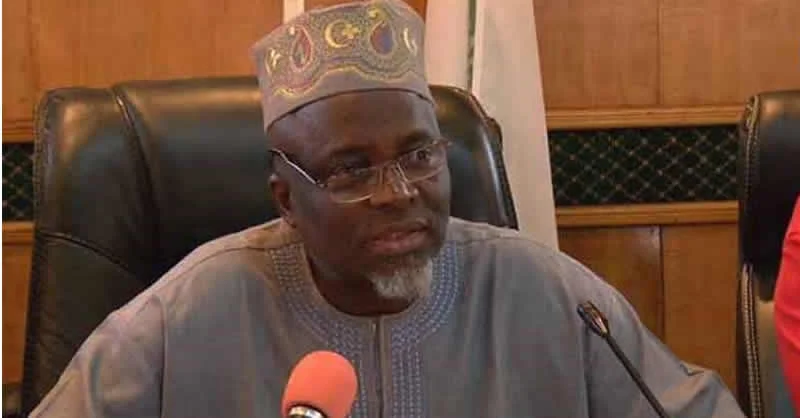
The Joint Admissions and Matriculation Board, on Monday, announced the release of the 2024 Unified Tertiary Matriculation Examination.
The Registrar of the Board, Prof. Ishaq Oloyede, made this known during an ongoing press briefing in Bwari, Abuja.
Oloyede also noted that the results of 64,624 out of the 1,904,189 who sat the examination have been withheld by the Board and will be subject to investigation.
READ ALSO: JUST IN: WASSCE Begins April 30
The Board Registrar noted that though a total of 1,989,668 registered, a total of 80,810 candidates were absent.
“For the 2024 UTME, 1,989,668 candidates registered including those who registered at foreign centres. The Direct Entry registration is still ongoing.
“Out of a total of 1,989,668 registered candidates, 80,810 were absent. A total of 1,904,189 sat the UTME within the six days of the examination.
READ ALSO: BREAKING: JAMB Releases 2024 UTME Results
“The Board is today releasing the results of 1,842,464 candidates. 64,624 results are under investigation for verification, procedural investigation of candidates, centre-based investigation and alleged examination misconduct.”
Oloyede also said the Board, at the moment, examines nine foreign centres namely: Abidjan, Ivory Coast; Addis Ababa, Ethiopia; Buea, Cameroon; Cotonou, Republic of Benin; London, United Kingdom; Jeddah, Saudi Arabia; and Johannesburg, South Africa.
“The essence of this foreign component of the examination is to market our institutions to the outside world as well as ensure that our universities reflect the universality of academic traditions, among others. The Board is, currently, fine-tuning arrangements for the conduct of the 2024 UTME in these foreign centres.”
Details later…

Tribunal Restrains MultiChoice From hiking DStv, Gotv Subscription Rates

Edo Guber: PDP BoT Member, Idahosa Resigns From Party

OPINION: Between Mike Adenuga And Prometheus
Trending

 News4 days ago
News4 days agoEdo: FRSC Threatens Sanction On Truck Drivers Loading Goods, Passengers Together

 Headline4 days ago
Headline4 days agoSaudi Arabia Opens First Alcohol Store, Nigerian Muslims React

 Headline4 days ago
Headline4 days agoVIDEO: Meet Nigerian Pastor Who Predicted World Will End April 25

 News4 days ago
News4 days ago243 Passengers Cheat Death As Air Peace Plane Makes Emergency Landing At Lagos Airport

 Metro4 days ago
Metro4 days agoJUST IN: Four-year-old Boy Dies In Abuja School, Parents Suspect Foul Play

 Metro4 days ago
Metro4 days agoJUST IN: Protesters Storm APC Secretariat, Demand Ganduje’s Resignation

 Politics4 days ago
Politics4 days agoEdo Guber: PDP Unveils 200-member Campaign Council

 News3 days ago
News3 days agoDSTV Price Hike: Five Alternatives Nigerians Are Opting For

 News4 days ago
News4 days agoEFCC Withdraws Appeal Against Former Kogi Gov, Bello

 News4 days ago
News4 days agoJUST IN: Senator Ayogu Eze Is Dead


